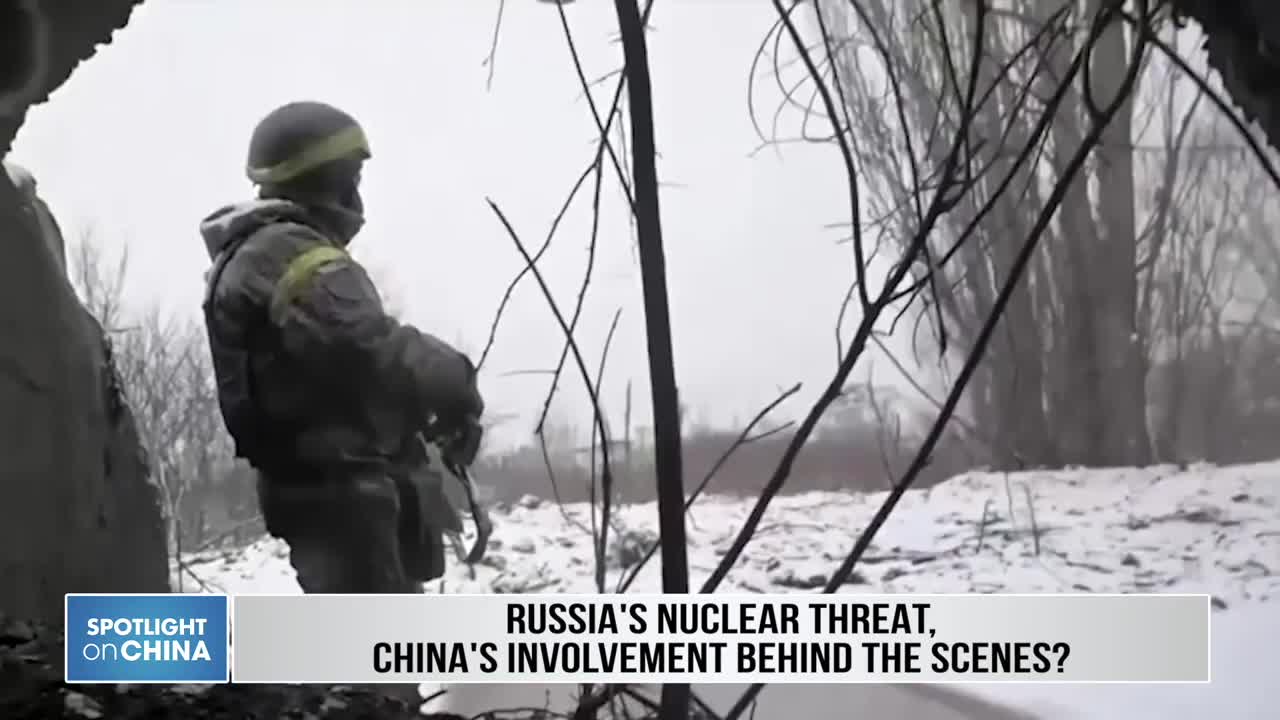Premium Only Content

Russia's nuclear threat, China's involvement behind the scenes?
The situation in Russia and Ukraine continues to escalate.
On Feb. 26, the Russian Ministry of Defense ordered an all-around attack on Ukraine, which Ukraine struggled to resist.
Meanwhile, the U.S., UK, EU, and Canada took further action to remove Russian central banks from the SWIFT international payments system. https://bit.ly/3Km30kK
On Feb. 27, the Russian army entered Kharkiv, Ukraine’s second-largest city. The fighting broke out in the city center.
Ukraine sent a delegation of officials to talk with Moscow “without any preconditions” near the Pripyat River on the Ukraine-Belarus border.
Putin claimed that due to unfriendly economic sanctions by Western countries, he ordered Russia’s nuclear weapons and other deterrents to be put on high alert.
Ukraine believes that Putin is trying to increase the bargaining card and put further pressure on the Ukrainian delegation. The United States and NATO have condemned Moscow as “threatening” and “irresponsible.”
Dr. Xiaoxu Sean Lin, a U.S. veteran, political analyst and commentator, and member of The Committee on the Present Danger: China, noted that on Feb. 24, when Russia began to invade Ukraine, the war situation has changed, and China’s rhetoric in the media has also changed significantly. https://bit.ly/3Km30kK
In the beginning, there was a view that the military strength of Russia and Ukraine was very different, and Russia would achieve its goal in a flash.
While China blocked anti-war speech on social media, it touted Russia and accused the Ukrainian government of many “crimes.”
The Chinese Embassy in Ukraine also issued a reminder on Feb. 24, saying that Chinese citizens in Ukraine can show their national flags to increase security. At the same time, they did not announce the evacuation of overseas Chinese.
However, the tide turned with the firm Ukrainian resistance, and many countries had sanctions against Russia and supported Ukraine.
The China Embassy in Uzbekistan immediately issued a warning, telling the local Chinese to “don’t show their identities and display signs at will” to reduce security risks.
In China, social media Weibo, Douyin and WeChat began to delete information about China’s support for Russia on a large scale.
Qin Peng, a current affairs commentator, highlighted that on Feb. 27, CCTV reported the war had turned into a “stalemate.” However, they also talked of peace values and raising funds to support Ukrainian. https://bit.ly/3Km30kK
The U.S. called on China to condemn Russia. In a press briefing, White House Press Secretary Jen Psaki said, “this is not a moment to be on the sidelines” and that Beijing should look at itself, and this is “a moment to think about where you are in history.”
But is it possible for China to stand up and condemn Russia’s invasion?
Xiaoxu Sean Lin said that a big mystery is whether Russia planned to invade Ukraine and whether it shook hands with China in advance; whether Beijing was a bystander or a behind-the-scenes participant in the Russian military’s actions.
In a New York Times report, back in November 2021, the U.S. informed China of Russia’s aggression plan. It held six emergency meetings hoping China would do something to prevent the invasion. Instead, China rejected the U.S. request and even disclosed the information to Russia.
There is also a question of China signing a large oil contract of nearly $80 billion with Putin before the war.
Qin Peng, a current affairs commentator, concluded that observers believe that China regards Russia’s invasion of Ukraine as a rehearsal for its invasion of Taiwan. Therefore, those pro-CCP are clamoring, “Ukraine today, Taiwan tomorrow.” https://bit.ly/3Km30kK
But Russia’s invasion of Ukraine is getting foiled, and Russia quickly fell into a state of isolation. So now there is a reverse saying, “Today’s Russia, tomorrow’s CCP.” https://bit.ly/3Km30kK
-
 1:11:52
1:11:52
LFA TV
11 hours agoDebt Tuesday: Trump: More Tariffs on Canada, Mexico, China | WORLD HD 11.26.24 @8am EST
8.52K2 -
 1:05:00
1:05:00
Part Of The Problem
12 hours agoDave Smith | Trust the Science | Part Of The Problem 1196
46.2K35 -
 13:58
13:58
Tactical Advisor
17 hours agoBudget vs Expensive Shotgun
25K11 -
 14:19
14:19
justintech
13 hours ago $3.07 earnedBest Gaming PC Under $2000 - In 2024
14.3K6 -
 5:09
5:09
Guns & Gadgets 2nd Amendment News
23 hours agoFBI Stops 9/11 Style Terror Attack!!
20.2K21 -
 9:39
9:39
GBGunsRumble
23 hours agoGBGuns Armory Ep 128 Kimber R7 Mako Carbon Compact
51.6K6 -
 1:00:51
1:00:51
The Tom Renz Show
21 hours ago"DEI Is Racist - Who knew & Redfield Now Worries About COVID Jabs"
66.8K8 -
 5:01
5:01
BIG NEM
14 hours agoInside the Albanian Mob... As a Serb.
33.7K2 -
 1:40:14
1:40:14
TheConnieBryanShow
4 days agoGAIN OF FUNCTION: MRNA, D.A.R.P.A. & THE PFIZER PAPERS
27.3K5 -
 2:14:01
2:14:01
Fresh and Fit
10 hours agoDr. Disrespect Moves To Rumble!
82.1K61